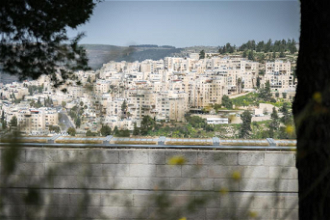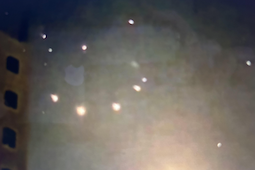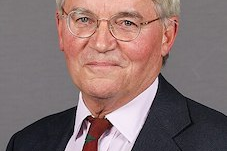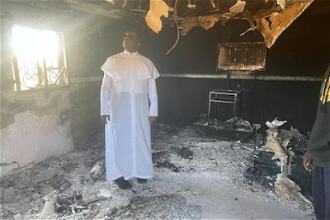Iran: Christians come under increasing pressure as violence flares
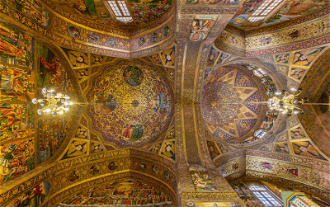
Armenian Cathedral, Isfahan
As Iran marks the fortieth anniversary of the Islamic revolution, the country faces a fifth day of demonstrations in dozens of cities. Anger at a reduction in petrol subsidies quickly developed into protests about corruption and economic mismanagement.
Middle Eastern news agencies report that government buildings have been attacked, security forces have used live ammunition, Amnesty International believes at least 106 people have been killed, and the internet has been cut. Meanwhile, according to the NGO Open Doors, Iran is the ninth most dangerous place to be a Christian.
In 1979, few Western leaders grasped the full impact of Ayatollah Khomeini's return. The Saudis reacted by spending billions of dollars on armaments each year, cracking down on what little freedom there was in the Gulf, and more recently sponsoring a proxy war in Yemen, at devastating human cost. Figures released by the Campaign Against the Arms Trade reveal that the UK has sold $5 billion of weapons to Saudi since the Yemen conflict began.
The Gulf nations' fear of expansionist Shia Islam also led to them to back Saddam Hussein in the long-running Iran-Iraq war, claiming a million lives. The UK, which continued to arm and train the Iranian security services during and after the US embassy hostage siege, sold arms to both sides throughout the war. When I visited a military cemetery outside Tehran in 1991, I found hundreds of graves of boys as young as eight. They had been sent into battle armed only with a plastic key with which, they were told, they could open the gates of paradise.
Saudi has invested an estimated $100 billion on madrassas to promote Wahhabism, its extreme version of Islam. Middle East expert James Dorsey has catalogued thousands of Saudi-financed institutions in Pakistan and elsewhere, spreading intolerance of Christians, Jews and Shia Muslims. The conflict in Syria, and instability in Lebanon, Iraq, the Holy Land and Bahrain are also extensions of the Iran-Saudi proxy war.
I spent two weeks traveling around Iran by bus in 1991, accompanied by my husband and two British friends. The regime's contradictions were immediately obvious. The rebranded Intercontinental Hotel in Tehran had a massive banner in the lobby declaring "Death to America." Yet, the restaurant served Southern fried chicken and hamburgers, and everything had to be paid for in US dollars. Out in the markets, t-shirts of Arnold Schwarzenegger and Sylvester Stallone were popular.
We encountered no other foreigners as we travelled, marvelling at Iran's spectacular mosques; almost everywhere, people were friendly and curious. The exception was the holy city of Qom, where the locals regarded us with suspicion. Since Qom was a centre of learning, its citizens may have been aware of the West's role in overthrowing Iran's democratically elected leader, Mosaddegh, in 1953, when he tried to nationalise the nation's oil.
Women's restrictive dress code was rigidly enforced in 1991, although my husband assures me that Iranian girls had found inventive ways of using their heavily-made-up eyes to flirt. When I entered our hotel in the company of my friends, there was much kowtowing by the male employees. But when I ventured out alone, they cursed me with expressions of pure hatred. Their reaction could have been inspired by their loathing of uppity women, or Westerners, or of people with enough money to travel the world; or a combination of all three.
Yet, we also encountered people's disgust at the behaviour of the religious elite. Whenever an ayatollah passed by, everyone had to spring to their feet to show respect. Yet, scanning the faces of the Iranians around us, people's resentment was clear. These guardians of the nation's morals were perceived as privileged, corrupt and hypocritical by many Iranians. Taxi drivers in Tehran would avoid picking up ayatollahs, knowing they wouldn't pay at the end of the ride.
Back in 1991, a certain degree of Christian religiosity was tolerated. Many of the nation's Orthodox Armenians live In the New Julfa area of Isfahan. They built the jewel-box-like Holy Saviour cathedral there after being forcibly resettled by Shah Abbas in 1606. From the outside, it looks remarkably like a mosque, but inside, every inch of walls and ceiling are covered with blue and gold frescos and tiles. It is said that the Persians wanted the Armenians in Isfahan because they regarded them as good business people and financiers.
Now, Iran's 300,000 Christians are targeted under laws that persecute evangelism and illegal house churches. Christians are charged under vaguely defined laws prohibiting the endangering of national security, insulting the Prophet, and enmity against God. Open Doors reports that raids on house churches have surged, with 114 people arrested in one week last year. Those most at risk are Muslims who convert to Christianity. Yet, the West fails to appreciate the risks faced by Iranian Christians and other minorities: while Sweden accepts Muslim asylum seekers, it has just deported Midia Moloudpoor, a nineteen-year-old Christian who fears being returned to Iran.
Back in 1991, Tehran's roads were littered with broken-down vehicles, and Iran's air fields displayed planes abandoned because sanctions prevented the import of spare parts. Almost thirty years later, the economy is in a worse state, and Rouhani, the relatively moderate president, lacks a power base within the regime. There have been several uprisings, extinguished by brutal Basij militia and the Revolutionary Guard. But they have rarely been supported by Iranians beyond the educated and wealthy residents of North Tehran.
Now, the new wave of demonstrations has reached 100 cities across the country. Kayhan, the ultraconservative newspaper, claims that protesters have "confessed their links to a campaign by foreign states to instigate violence."
The removal of bread subsidies in Sudan a year ago signalled the beginning of the end of the world's second Islamic republic; will the first Islamic republic ride out the current discontent?



